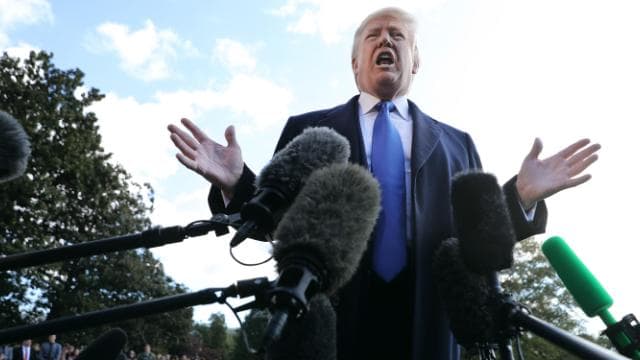
President Donald Trump dealt a blow Friday to investors who were hoping the United States and China were inching closer toward a partial trade deal that would roll back billions in tariffs.
Speaking to reporters, Trump said the US has yet to agree to wiping tariffs, undercutting a statement from China's Commerce Ministry indicating openness to such a concession as part of the first phase of a trade deal between the world's economic superpowers.
"They'd like to have a rollback," the President said. "I haven't agreed to anything. China would like to get somewhat of a rollback, not a complete rollback because they know I won't do it."
The tariffs have been a major sticking point in the negotiations between the two countries, and the latest twist sent stocks falling -- a repeat of earlier episodes in which Trump himself injected uncertainty, even as breakthroughs in negotiations seemed imminent.
It's been almost a year since Trump and Chinese leader Xi Jinping announced an imminent deal after a meeting in Buenos Aires, Argentina. But in the ensuing months, both sides have settled into a tit-for-tat pattern, rattling markets and depressing business investment -- a major drag on the US economy.
The repetitive script of these on-and-off negotiations had close observers skeptical of positive signals from both sides even prior to Trump's comments on Friday.
"We've learned with these negotiations they're not done until the ink is dry and then it's filed, and even then you still have to wait a little while," said Scott Kennedy, deputy director of the Freeman Chair in China Studies at the Center for Strategic and International Studies, a Washington think tank. "I'm still not convinced that it's a done deal."
UBS economist Robert Martin warned in a note to clients earlier in the week not to "place hope before expectation" as signs pointed to a delayed meeting in December between Trump and Xi.
"We have long noted that signing a comprehensive deal could prove elusive and we now have confirmation that signing even the skinniest of trade deals is proving problematic," said Martin. "We suspect the delay in signing reflects the fundamental disagreements over the scope and content of phase one."
In recent weeks, the President's own advisers have been urging Trump to deescalate trade tensions with China or else risk damaging the US economy and his re-election bid in 2020.
"Our advice was get the best deal you can get now because once you get a deal signed the economy will be unleashed," said Stephen Moore, a former CNN contributor and distinguished visiting fellow at the conservative Heritage Foundation who was briefly considered for a seat on the Federal Reserve Board earlier this year. "It's the only thing that holding growth back right now."
Manufacturing and capital investment have languished as a result of the uncertainty of the trade war that has roiled markets for the better of part of 2019. Since the early days of trade talks, American businesses have sat on the sidelines taking a wait-and-see approach on whether Trump would be able to successfully rewrite the trading rules with China, protect their intellectual property, and stop Beijing from forcing US companies to hand over their technology.
Such uncertainty brought on by the Trump administration's erratic trade strategy has slowed the economy, keeping the President's goal of annual 3% economic growth out of reach just one year before voters head to polls in November.
It's also cost Americans an additional $38 billion due to tariffs slapped on everyday consumer products, according to new data released by Tariffs Hurt the Heartland this week, and forced the Federal Reserve to slash interest rates three times this year to insulate the economy from a possible downturn.
And while US and Chinese negotiators may be on track to closing in on a slim trade deal, it will likely fall short of achieving long-stated goals by the Trump administration.
"If the administration had done nothing on China policy, we'd be at the same place we are now or maybe even better," said Kennedy. "A Daoist approach of 'do nothing' may have been more effective."